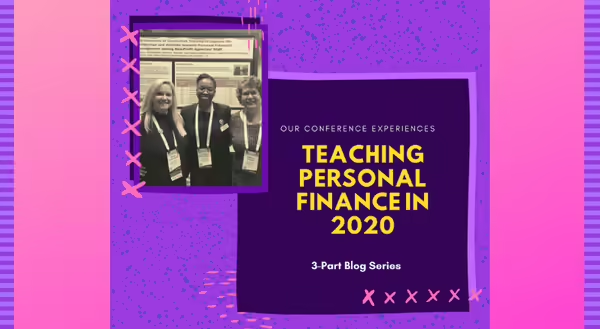
Sasha, Kathy, and I attended three virtual conferences in the span of a week (November 13-20)! As personal finance educators, we find opportunities each year to attend, present, and exhibit our work at national conferences. We are members of the Association for Financial Counseling and Planning Education (AFCPE), and we always have a phenomenal time connecting with our national colleagues, meeting new attendees, and learning about new research, innovations, and financial technology. The challenges of 2020 have moved AFCPE and our other conferences to virtual platforms. In addition to AFCPE, between the three of us, we participated in two more conferences, FinCon and the University of Illinois Extension Annual Conference.
In this series of blog posts (November 30–December 2), we are sharing some of the highlights from these conferences. It was hard for me to select only a few things to talk about because there was a lot of great information. However, to keep this first post in the series short, I will share only a few key takeaways from the sessions in which I participated:
Financial topics can be challenging, and some are considered taboo. I attended the free sessions offered by FinCon on Friday, November 13, 2020, and one of my favorite talks came from Tanja Hester, who focused on how we approach hard and scary financial subjects. Tanja suggested:
- Normalizing hard money topics
- Connecting with our audiences from a real place
- Dropping the façade of perfection when it comes to money management
- Using substantial evidence from reputable non-partisan sources
- Employing empathy to identify with people’s experiences
During AFCPE, there were several sessions about strategies to manage finances during the current economic downturn. One of the sessions from Melinda Croes, with Credit Builders Alliance, covers information on the realities of credit during the COVID-19 era. Since there is a general confusion about obligations and accommodations, Melinda suggested several ways to think about credit and the pandemic. At the beginning of a crisis, consumers may use credit to survive and stay afloat; however, it becomes increasingly important to reduce unnecessary damage to your credit and engage in behaviors that protect and help recover or rebuild your credit history.
All the conferences incorporated sessions on diversity, inclusion, engagement, and access (DIEA). Financial stress has unique challenges for different groups and audiences we serve. Some of the networking opportunities facilitated discussions on understanding cultural differences and belief systems. In the networking groups, the issues discussed included: understanding family dynamics (those who manage the money in the family), systemic challenges that create barriers to financial well-being, traditional money practices –among others. A few recommendations included breaking down barriers and building trust, explicitly state the importance of confidentiality and privacy in all communications, and diversifying resources.
Kudos to the conference organizers who created genuinely wonderful experiences and worked with attendees to address any technical problems. Overall, there was some great information shared at the fall conferences. Check out our next posts for more information and resources.